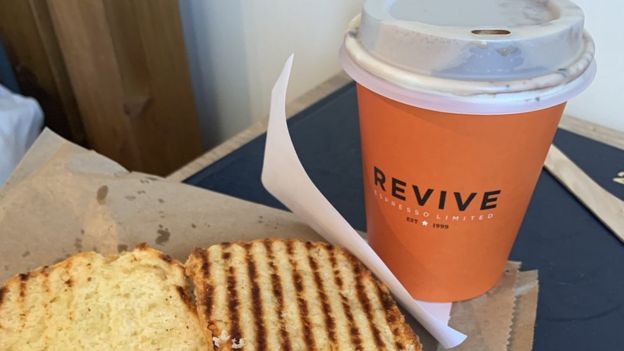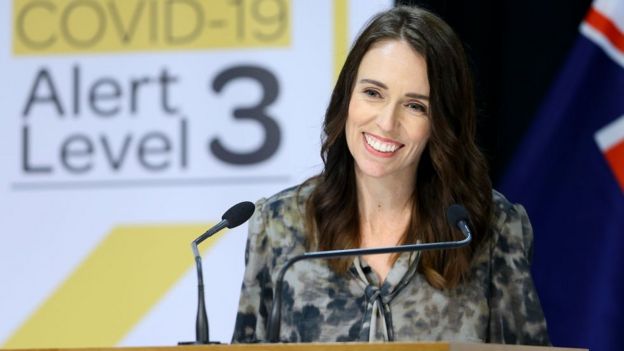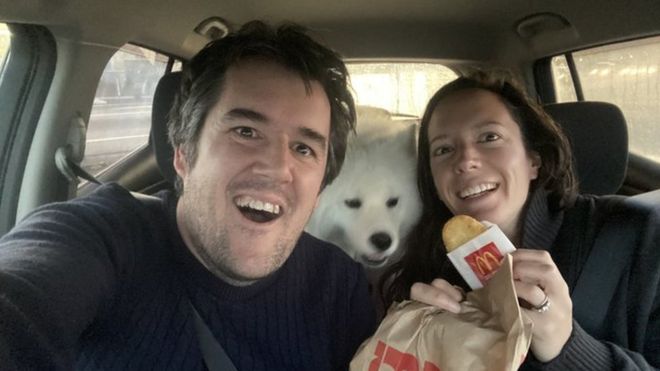Coffee and fast food seemed to be the first thing on the mind of New Zealanders as the country emerged from almost five weeks of strict lockdown.
The alert level has shifted to level three, allowing takeaway food shops and some non-essential business to re-open.
And it wasn't long before queues were seen in front of coffee shops and McDonalds outlets as people rushed out.
"That cup of coffee tasted amazing and I felt a sense of normality come back into my life," said one coffee lover.
"Nothing beats a skilled barista making you coffee," Victoria Howe, who is based in Auckland, told the BBC.

Dr Samantha Keene, a New Zealander based in Wellington agreed, saying "the ability to get a coffee and a scone made by someone else after weeks of doing it myself was a real treat".

But it was the re-opening of McDonalds that got people most excited - with local media speaking to one Auckland resident who said he arrived at 04:00.
Pictures online showed queues of cars and people posing with their fast food loot.
"It's just great to have a wee treat at the end of a pretty tough period in lockdown," Christopher Bishop, a local MP, told the BBC, adding that his order was "a delicious Sausage and Egg McMuffin".
'Don't congregate at cafes'
But though the curve appears to have flattened, New Zealand's top health expert warned against people congregating outside public spaces.
"Like many people returning to work today, I have enjoyed a takeaway coffee. However it is important not to congregate outside the cafes, the carpark of takeaway places like McDonalds. We do not want to see the sort of rebound we have seen in other countries," said Dr Ashley Bloomfield.
Under the level three alert - a notch below its highest alert level - people have still been told to stay at home and work at home if they can, but businesses are allowed to open if they can provide contactless service.
Schools are also allowed to re-open but will have to ensure social distancing rules are followed. Mass gatherings however, remain cancelled and public venues closed.
New Zealand currently has 1,124 confirmed cases and 19 deaths out of a population of around five million people. Its new cases have stayed in the single digits for several days, leading the government to say that the virus was effectively eliminated.
What did New Zealand do right?
New Zealand's apparent success in containing the virus has been attributed to its early and sweeping actions.
- It closed its borders
New Zealand brought in some of the toughest restrictions in the world on travel and activity on 19 March, early on in the global pandemic.
That helped stop cases being brought in from overseas - 33% of New Zealand's cases were imported.
As Prime Minister Jacinda Ardern said at the time: "We only have 102 cases, but so did Italy once."
"If you look at neighbouring Australia, two-thirds of its cases came from overseas," Prof Sanjaya Senanayake of the Australian National University told the BBC.
"So it was really important to close the borders and it did that very effectively."
- It had a quick, clear lockdown
On 21 March, New Zealand introduced a new public alert system with four levels - the highest being a total national lockdown and the lowest indicating that the disease was contained but people should be prepared.
It went in at level two, which meant there was a growing risk of community transmission. Days later, the country moved into a level four alert.
Offices, schools and public spaces like beaches and playground were shut. Bars and restaurants were also closed - including for takeaway and delivery.
- It traced and tested
The ministry of health says 80% of close contacts of someone confirmed with the virus are now being alerted within 48 hours of the diagnosis.
That means those people can self-isolate until the incubation period has passed, and they can get tested. Officials say 8,000 people are being tested each day.
There has been some criticism though that contact tracing needs to be scaled up even more if it's to remain effective.
People are also being encouraged to keep a diary of people they interact with, and New Zealand is also working on a contact tracing app, similar to those in use in Singapore and Australia.
- It told people to pick a 'bubble'
New Zealanders were not told to stick only to their households but to their "bubble" - a small group of close friends or family who all agreed to only see each other.
Experts say this approach can make people less restricted, so less tempted to break the rules.
They were also told early on to stay 2m (6ft) away from people.
- A clear public message
The government has also been praised for the clarity of its messaging throughout the crisis, with Ms Ardern and Dr Bloomfield singled out for praise.

"I think when you hear your prime minister deliver sensible information in a calm manner that also helps you feel calm," said Prof Senanayake.
But he warned against lifting restrictions too early, saying people still had to "remain vigilant".
"I think the best way to lift restrictions is to do it piece by piece, watching very carefully for a surge in cases," he said.
"The only way to do that is to continue surveillance and enhanced testing. Today the restrictions have come down but if cases surge you have to consider returning to restrictions. It's something you have to remain vigilant about."
Latest Stories
-
Case challenging Anti-LGBTQ bill constitutionally was premature – Foh Amoaning
4 minutes -
Fifi Kwetey: An unstoppable political maestro of our time
7 minutes -
Volta Regional ECG Manager assures residents of a bright Christmas
14 minutes -
Taste and see fresh Ghanaian flavors on Delta’s JFK-ACC route
15 minutes -
ECG to pilot new pre-payment system in Volta Region in 2025
20 minutes -
Hammer splits ‘Upper Echelons’ album into two EPs; addresses delay in release
23 minutes -
NDC MPs back Supreme Court’s ruling on anti-LGBTQ bill petition
34 minutes -
Dr. Rejoice Foli receives Visionary Business Leader Award
37 minutes -
Economic missteps, corruption, unemployment and governance failures caused NPP’s crushing defeat – FDAG report reveals
39 minutes -
Supreme Court, EC need complete overhaul to safeguard our democracy – Benjamin Quarshie
42 minutes -
Dr. Elikplim Apetorgbor: Congratulatory message to Mahama
48 minutes -
Gabriel Kumi elected Board of the Chamber of Oil Marketing Companies
56 minutes -
Ga Mantse awards scholarships worth GHȼ100,000 to pupils in Ga communities
1 hour -
NDC minority did not help the governance of the country – Afenyo-Markin
1 hour -
NDC gov’t will struggle to fund social intervention programmes – Afenyo-Markin
1 hour

